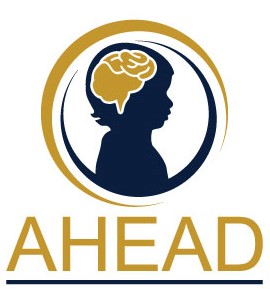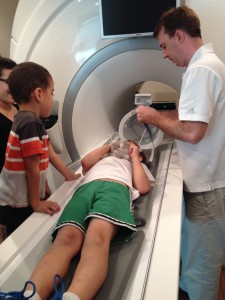Project AHEAD ("ADHD Heterogeneity of Executive Function and Emotion Regulation Across Development")

- More info - Project AHEAD
Summary of Aims
In collaboration with Dr. Anthony Dick, this project aims to examine the feasibility of identifying "biosignatures" derived from an integration of neuropsychological, neurobiological (functional and diffusion-weighted magnetic resonance imaging; fMRI and DWI-MRI) and autonomic (ANS) pathophysiological markers of executive function (EF) and emotion regulation (ER), which may aid in the early identification and tailored treatment of behavioral phenotypes of ADHD. Additionally, we propose to examine the extent to which the identified "biosignatures" predict children’s early intervention response.

Summary of Background
Despite
successful development of evidence-based treatments for ADHD, early interventions have little impact on children’s long-term academic and social impairment. Longitudinal studies have documented that few preschool children with ADHD go on to be well-adjusted during adolescence even when their symptoms improved over time. A major barrier to understanding the long- term outcomes and treatment gains in ADHD is that current definitions of the disorder rely solely on DSM-V symptom profiles. This simplistic classification system a) limits understanding of the known behavioral, cognitive, and emotional heterogeneity in ADHD, b) limits early identification of young children with ADHD, and c) hampers efforts to individualize interventions to improve long-term academic and social outcomes. Furthermore, continued focus on single neurobiological and pathophysiological markers has not adequately captured the heterogeneity of the disorder, in particular, in the EF and ER domains. Consistent with NIMH’s strategic plan and RDoC, the proposed study (see conceptual model in Figure 1) seeks to overcome these limitations by examining the feasibility of identifying “biosignatures” derived from an integration of neuropsychological, pathophysiological (Aim 1) and neurobiological (functional-Aim 2 and structural-Aim 3 magnetic resonance imaging; fMRI and DWI-MRI) markers of EF and ER, which may aid in the early identification and tailored treatment of phenotypes of ADHD (NIMH’s strategic objective 1.3). Additionally, we propose to examine in an exploratory fashion (Aim 4) the extent to which the identified “biosignatures” predict children’s early intervention response (NIMH’s strategic objective 2.3), with a focus on the social and academic domains, and above and beyond traditional phenotypic measures (i.e., ADHD symptoms).
Summary of Sample and Recruitment. Participants will be 288 young children ages 4-6 (144 with ADHD). Participants will be recruited from Miami-Dade County Schools in the city of Miami, FL. The Center for Children and Families (CCF) has a collaborative relationship with Miami-Dade County Schools and has provided workshops to staff on issues related to ADHD. Miami-Dade County Schools represent an ideal location to conduct this research as it is the 4th largest school district in the nation with over 75,000 children ages 5-7. For the recruitment of typically developing children, we will take advantage of our access to State of Florida birth records. Laboratories in the FIU Psychology department maintain a shared database of children who have participated in previous studies as infants. We receive monthly lists of new potential participants. The ethnic and economic diversity of Miami-Dade County represents another advantage of this project’s setting. According to district data, approximately 70% are Latinos while approximately 27% of public school students are eligible for free or reduced school lunch. This sample composition will help in our goal to enroll a diverse group of participants to maximize the external validity of the study. Given that we expect a larger percentage of boys vs. girls in the ADHD group (80%/20%), we will stratify the typical group to match the ADHD group on child sex. Because research suggests sex differences in neurobiological profiles, we will make every effort to recruit girls to examine sex as a moderator as it relates to all our aims.
- Publications
Early childhood behavioral and neurobiological profiles in the prediction of obesity: The role of self-regulation and the caregiving environment

- More Info - Early childhood behavioral and neurobiological profiles in the prediction of obesity
Summary of Aims
While the prevalence rates of pediatric obesity have plateaued in recent years, a staggering 35% of school age children remain classified as overweight/obese (OV/OB). In collaboration with Drs. Anthony Dick and Catherine Coccia, the current study focuses on developing behavioral phenotypes based on self-regulation processes (i.e., EF, ER, and RS), which will then be examined within a neurobehavioral vulnerability model of eating. Longitudinal studies are desperately needed that a) comprehensively measure behavioral phenotypes using multiple levels of analyses (i.e., behavioral, neurobiological, pathophysiological), b) examine the extent to which such phenotypes relate to obesogenic mechanisms (e.g., self-regulation of energy intake, healthy-habits) and subsequent weight trajectories and c) examine how environmental factors (e.g., parenting) can contribute to and moderate the link between phenotypes and weight outcomes. We leverage the ongoing data collection as part of award R01MH112588 (PI Graziano/Dick), which is measuring young children’s (ages 4-6) self-regulation processes at a behavioral, neuropsychological, and neurobiological level via task-based functional and structural MRI. The proposed ancillary study seeks to further collect a) obesogenic mechanistic measures such as self-regulation of energy intake (via observed eating) and healthy-habits (i.e., physical activity, dietary habits), b) parenting measures related to feeding (observed mealtime interactions), and c) weight-related outcomes (i.e., BMI and % body fat) across two yearly time points. As seen in our model (Figure 1), this study will first develop behavioral phenotypes based on EF, ER, and RS (aim 1) and then use such phenotypes to predict obesogenic mechanisms (aim 2a) and subsequent weight trajectories (aim 2b). We will then examine the extent to which parenting (aim 3a) and the home environment (aim 3b) moderate the link between phenotypes and both obesogenic mechanisms and later weight trajectories.
Summary of Background
Broadly speaking, work by PI Graziano among others have documented self-regulation (SR) as an important mechanism for understanding the development of pediatric obesity as well as its shared co-morbidities with other mental health disorders (e.g., Attention-Deficit/Hyperactivity Disorder [ADHD] [18-22]. Within the cognitive domain, some studies suggest that poor executive function (EF) is associated with obesity. These studies, however, tend to be cross-sectional in nature and have focused primarily on adolescents and adults [32-33, 43-46]. Additionally, given the non-unitary nature of EF, a more refined and extensive measurement of EF is needed given that several domains of EF may be implicated in eating behaviors including a) inhibitory control, b) cognitive flexibility, and c) working memory. Within the emotional/affective domain, some studies have documented the role of emotion regulation and reactivity (ER) in the development of obesity. For example, individuals tend to overeat during periods of emotional arousal and/or stress. PI Graziano also documented, in one of the few longitudinal studies, that poor ER in toddlerhood predicted BMI at age 10 [47]. Finally, within the motivational/learning domain, reward sensitivity (RS) has emerged as a critical underlying process in terms of contributing to overeating and food preferences. For example, functional neuroimaging work, done primarily with adults and older teens, has documented that individuals who are OB display hyper activation in brain regions implicated in reward processing (e.g., nucleus accumbens) when presented with high fat foods [62]. Thus, despite the identification of three viable underlying SR processes (EF, ER, and RS) that are associated with obesity, there are several critical limitations. These include:
- Lack of integration of these three SR processes when examining weight outcomes, as most studies have examined each of these SR processes in isolation, 2) Lack of longitudinal studies, which are needed to disentangle whether potential SR deficits are risk factors for the development of obesity or a consequence of it, 3) lack of comprehensive measurement of these SR processes in terms of integrating behavioral measures, neuropsychological, and neurobiological markers, 4) lack of studies examining the predictive association of SR processes as they relate to observed obesogenic mechanisms (e.g., SR of energy intake, healthy-habits) and 5) how environmental factors (e.g., parenting, home environment) can contribute to and moderate the link between SR phenotypes and weight outcomes.
Summary of Sample
Participants will be 288 young children ages 4-6 who are already participating in grant R01MH112588 (PI Graziano and Dick). Half of these participants will have ADHD confirmed via a gold standard assessment including a diagnostic interview and parent/teacher ratings on symptoms of ADHD as well as behavioral impairment. Participants are currently being recruited from Miami-Dade County Schools in the city of Miami, FL. The Center for Children and Families (CCF) has a collaborative relationship with Miami-Dade County Schools, which represents an ideal location to conduct this research as it is the 4th largest school district in the nation with over 75,000 children ages 4-6. The ethnic and economic diversity of the Miami-Dade County represents another advantage of this project’s setting. According to district data, approximately 70% are Latinos while approximately 27% of public school students are eligible for free or reduced school lunch. This sample composition helps to enroll a diverse group of participants to maximize the external validity of the study. Families will be excluded if child has dietary or exercise restrictions, a pervasive developmental disorder, has an IQ<70, is on psychotropic medication which may affect weight loss/gain, and parent/child is currently enrolled in a weight control program.
- Publications
*Coto, J., & Graziano, P. A. (2022). Targeting Pediatric Obesity via a Healthy Lifestyle Summer Camp Intervention: How Necessary Is a Parenting Component?. Childhood obesity (Print), 18(5), 350–359. https://doi.org/10.1089/chi.2021.0152
Coccia, C., Lovan, P., Macchi, A., Coto, J., Dick, A. S., & Graziano, P. A. (2022). How much and what: Using a buffet to determine self-regulation of food intake among young school-age children. Physiology & Behavior, 249, 113745. https://doi.org/10.1016/j.physbeh.2022.113745
Evaluating Parenting Programs at the Lotus House Women's Homeless Shelter

- More Info - Evaluating Parenting Programs at the Lotus House Women's Homeless Shelter
Located in Overtown, Miami, the Lotus House Women's Homeless Shelter was formed with the intent to support women and children by providing innovative solutions to alleviate child and family homelessness.
The purpose of the family strengthening program and early childhood community research demonstration, both funded by The Children's Trust, is to increase the current understanding of the status of homeless mothers and their children, improve child mental health status by providing therapeutic services to mothers and their children who reside in the shelter, and evaluate the effectiveness of services provided.

Psychological services provided to the families
include: Child-Parent Psychotherapy (CPP), Parent-Child Interaction Therapy (PCIT), andTrauma Focused Cognitive Behavior Therapy (TF-CBT).
The main research question involves comparing the efficacy of two treatment modalities (PCIT and CPP) being delivered to mothers and children ages 2 to 5.
We are also examining the feasibility of delivering CPP within 12 sessions for children younger than 2 years of age.
- Publications
